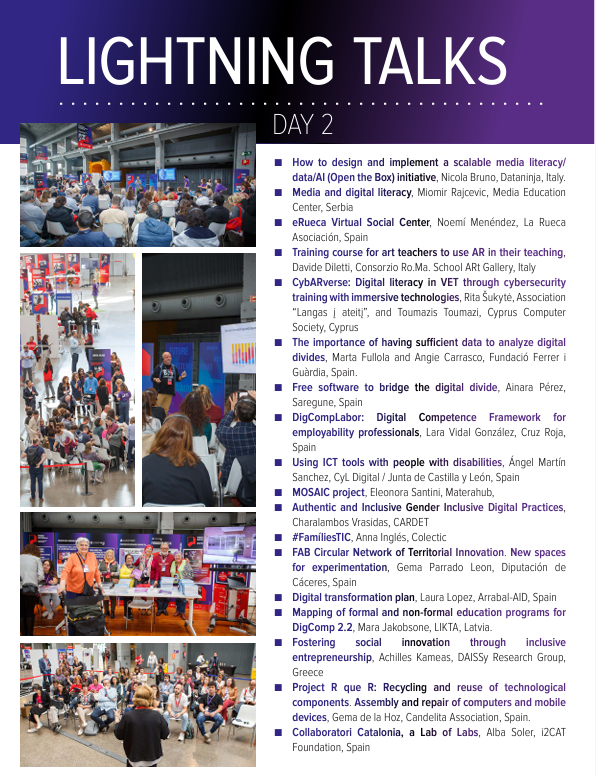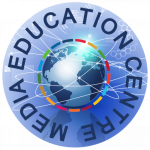The Summit of Engaged Digital Citizenship, a joint event organised by ALL DIGITAL and Fundacion Esplai, aimed at raising awareness of digital rights and skills. This three-day event took place from October 15-17, 2024 in the beautiful city of Madrid, bringing together experts from all over Europe to share their knowledge and views on the latest digital education and training developments.

Highlights
1. Summit of Engaged Digital Citizenship
- The Summit of Engaged Digital Citizenship was organized by ALL DIGITAL and Fundacion Esplai, held from October 15-17, 2024, in Madrid.
- The event aimed to raise awareness of digital rights and skills, with over 500 participants discussing digital education, employability, and entrepreneurship.
- Four key streams were focused on: Fostering Digital Society, Educating on Media Literacy Data AI, European Digital Rights Online Safety Wellbeing Guiding Policy Principles, and Empowering Digital Social Innovation.
- A policy document titled “Challenges proposals for engaged digital citizenship” was developed from the discussions.
2. Workshops on October 15
- Three workshops were conducted: Anti-Rumour by Stiftung Digitale Chancen, We Want to Decide by Colectic, and MyHood App by EPMA.
- Anti-Rumour focused on combating disinformation and conspiracy theories, emphasizing environmental awareness and social inclusion.
- We Want to Decide aimed to incorporate children’s perspectives into urban planning and public policy using the Decidim platform.
- MyHood App educated youth about climate change and urban sustainability, allowing participants to test the app on the streets of Madrid.
3. Keynote Speeches and Panels on October 16
- Marta Markowska from the European Commission emphasized the urgent need to address Europe’s digital skills shortage and the importance of digital literacy for citizenship.
- Anahí Vallejos Mihotek discussed the intersection of social innovation and digital technology, highlighting the need for equitable digital access and participatory development.
- Panels on Fostering Digital Society and Empowering Digital Social Innovation addressed challenges like digital divide, inclusivity, and the role of technology in education and employment.
4. European Digital Rights and Online Safety
- Discussions focused on ensuring inclusivity and accessibility in the face of rapid digitalization, with the EU aiming for 100% of public services to move online by 2030.
- Emphasis was placed on the need for bottom-up approaches, starting from neighborhoods to ensure digital inclusion and citizenship.
5. Sharing Training Certification Tools in Europe
- The panel discussed the Pix online platform for assessing, developing, and certifying digital skills, highlighting the importance of European coordination to reduce costs and avoid duplication of efforts.
- The adaptability and interoperability of the Pix framework were emphasized, with positive experiences shared from Belgium and Spain.
6. Digital Skills Policies for Employability
- The panel highlighted the need for cross-functional digital skills training across all sectors and fostering collaboration between organizations to align training with local community needs.
- Challenges included the digital skill gaps among individuals over 55 and the lack of coordination between entities in identifying needed skillsets.
7. Social Innovation for Change
- The panel emphasized the need for a humanistic approach to digital tools, focusing on relationships and understanding human needs.
- Proposals included building alliances between citizens, public administrations, and other stakeholders to foster collaboration and eliminate barriers.
8. Digital Rights in the Age of Artificial Intelligence
- Discussions centered on the ethical implementation of AI, privacy, and data protection, with a call for transparency and responsible innovation.
- Training programs were highlighted as vital to empowering citizens and bridging the digital divide, especially for vulnerable groups.
9. ALL DIGITAL Awards Ceremony
- Six awards were presented to individuals and organizations driving digital inclusion and skill development across Europe.
- Categories included Best Digital Educator, Best Digital Changemaker, Best Digital Resource, Best Event, Best Campaign, and Best use of GenAI in Education.
10. Institutional Welcome and Keynote Speeches on October 17
- Antonio Llorente Simón and Francis Valverde Mosquera emphasized the need for targeted policies to eradicate poverty and foster an inclusive digital ecosystem.
- Thibaut Kleiner from the European Commission highlighted the EU’s vision for a human-centered digital transformation, emphasizing inclusivity, safety, and security online.
11. Integrating Emerging Technologies in Education
- The panel discussed the importance of integrating AI and IoT into education to enhance learning and teaching approaches.
- Courses developed under the ALL DIGITAL Academy project were introduced, focusing on AI, IoT, and generative AI in education.
12. Inclusion and Digital Accessibility
- The session addressed the challenges digitalization poses to vulnerable groups, emphasizing the need for universal accessibility and inclusive digital advancement.
- Proposals included fostering a better understanding of diversity and adopting a sensitive approach when introducing technology to diverse groups.


